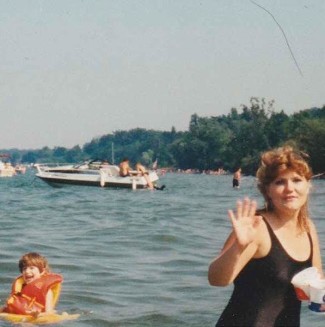 Elizabeth Taddonio’s Stone Boats, a slim twenty-page, memoir-style chapbook, pulls the reader as close to the surface of experience as possible only to show that emotions and memory churn below at unfathomable depths. It accentuates the simplistic joys and immense pains of existence with an honest humor that experienced novelists would do well to emulate.
Elizabeth Taddonio’s Stone Boats, a slim twenty-page, memoir-style chapbook, pulls the reader as close to the surface of experience as possible only to show that emotions and memory churn below at unfathomable depths. It accentuates the simplistic joys and immense pains of existence with an honest humor that experienced novelists would do well to emulate.
The narrative starts by displacing the reader, rather than situating them, with a narrator that presents lives she could have lived and experiences she could have had. There’s an immediate sense of simultaneous possibility and limitation, an encouragement of dreams anchored by an honest assessment of reality: “I am here to tell you that the lives we imagine we could have lived are ghosts for a reason.” Time exposes place, but those two limitations, so ubiquitous, seem less limiting here because Taddonio draws lines precisely, moving from past to present with the geography that accompanies them. The effect is that readers are free to inhabit the space of the work exactly wherever they are, each time they read. Her style is assisted by conversations that are out of place, or, as she says, “…that I didn’t provide myself enough context for.” These notes exist without apparent purpose, even if there was once a reason that motivated their being written. And in that way, the physical, too, becomes ephemeral: a reflection of the past that pervades the book from the cover photograph to the people who inhabit Taddonio’s memories.
Memories are varied things, formed by ourselves and our relationships with others—they are always present. Stone Boats encourages such reflection, illustrating the way that experiences develop us, but that our memories, even when they are distorted, define us. There is poignancy in its pages, especially in the particular way the narrative fixates on memories of human interaction. Taddonio’s exchanges with teachers, friends, and family represent a transformation from the tangible to the intangible. The experiences are themselves ghosts, as much as the alternate lives she mentions—but are the ghosts of experiences any more or less real than things that never happened?
This question reflects the sense of loss that pervades the book—the sense of a moment slipping away each time the page is turned, even as one reading turns into another and then another. Taddonio uses absence to paradoxically question and reinforce the real, and creates a portrayal of death as definition of the self, due to our ever-impending absence. Here, the most notable figure is her mother, whose death profoundly affects Taddonio, yet reinforces her perception of life as a sort of humorous curiosity: “…people get uncomfortable with illness and death and loss because no one really deserves loss. I find that idea odd sometimes—that no one deserves loss—because we all deserve loss, or at least we all get it.” Rare is the narrative that balances sentiment with candor as willingly as it does here.
This balance often leads to strikingly funny lines in the darkest of circumstances and anchors the philosophical wonderings of Stone Boats, which are profound in their own right. Combined with Taddonio’s wit, they make up a language all the more powerful: “You know you don’t need to build something new to contain all the rotting stuff in the world, the clover doesn’t care either way.” The honesty places Taddonio with some of the great female writers whom she alludes to: the book’s title and inscription taken from the Anne Sexton poem, along with references to Plath…. The confessional aspect of Taddonio’s writing prepares readers for the humor gleaned from her tragic insight.
All of these things—the humor and the themes of loss and memory—culminate in the books’ closing passages, which inspire a longing for more to read despite a fear that more would detract from the language already so artfully construed. What is finally impressed upon the reader is that we are all barely afloat, that we do the best we can while suffering this knowledge. Yes, our boats are stone; they sink because of this, and they sink for other reasons too—both ways responding to the circumstances imposed upon us. Stone Boats shows how we must accept this—and many of us do—but that acceptance does not prevent us from trying to rethink our perceptions, even if such reckonings are just so much bailing water.
Joshua Myers is a PhD student in English at Louisiana State University, where he focuses on environmental writing and nature in American literature—which developed from a solitary habit of bringing books along when he goes hiking. He is also the Interviews and Reviews Editor for New Delta Review. He writes literary reviews for Curled Up With A Good Book and most of his life has been on different sides of bookstore sales counters.
The chapbook Stone Boats (22 pages) by Elizabeth Taddonio is available from Spooky Girlfriend Press (March, 2015).